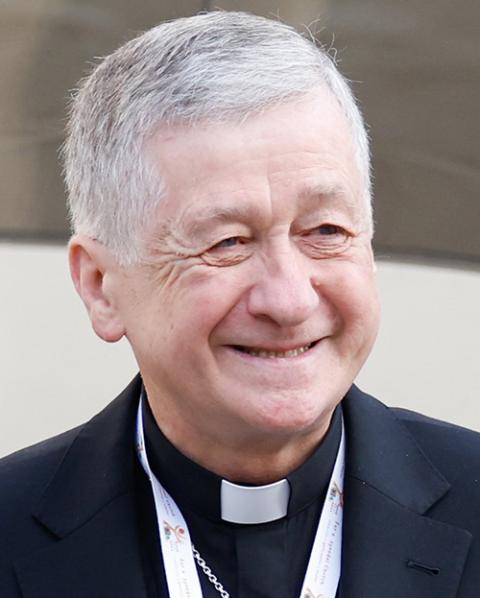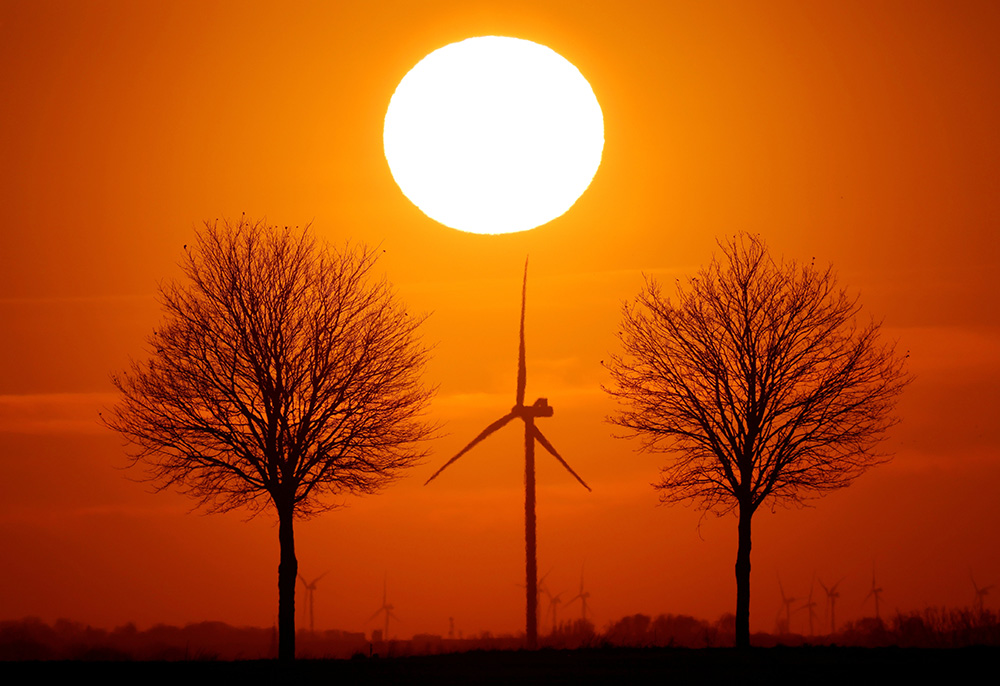
Windmill turbines are seen in this illustration photo. Since the U.S. church owns nearly 100,000 buildings, Catholic decarbonization could shift local energy markets and show society the morality of decarbonization. (CNS/Reuters/Pascal Rossignol)
Feb. 20 is World Day of Social Justice and it is important for Catholics to celebrate this day. The church affirms social justice, which reforms institutions and policies, as key to Catholic social teaching. The U.S. bishops assert, "Catholic social teaching is a central and essential element of our faith." The church also acknowledges that to offer credible witness, it must embody social justice through ecclesial policies that enact its social teaching.
Animated by Catholic social teaching, especially Pope Francis' Laudate Deum and the U.S. bishops' climate advocacy, each bishop should enact a science-based diocesan decarbonization policy. Such commitment engages faith and reason to advance the church's evangelical mission.
Archbishop Thomas Zinkula of Dubuque, Iowa, and Cardinal Blase Cupich of Chicago are leading the way. Catholics should engage in synodality and encounter their bishop to advocate similar episcopal leadership.
Ecclesiology and missiology
As detailed in Lumen Gentium, the church is the people of God called to advance God's kingdom of love, justice, peace and ecological sustainability. We fulfill this mission through evangelization, which occurs through "living testimony as well as by the spoken word."
Advertisement
This means the church must act to "be, on earth, the initial budding forth of that kingdom" by living its social teaching, says Lumen Gentium. In Justicia in Mundo and Evangelii Nuntiandi, the church recognizes it will lack credibility to advocate for civic social justice if it does not embody its own teaching.
While Gaudium et Spes says all are called to this work, bishops are uniquely ordained to steward the church's evangelical mission by "teaching, sanctifying, and governing," as stated in Christus Dominus. Governing entails administering diocesan resources through policies — ecclesial social justice — that enact Catholic social teaching.
Catholic teaching on climate change
In 1990, St. John Paul II warned in "Peace With God the Creator, Peace with All Creation" that the " 'greenhouse effect' has now reached crisis proportions" due to human activities. In the subsequent 30 years, he, Popes Benedict XVI and Francis, and bishops' conferences have consistently recognized climate change as an urgent moral crisis.
The U.S. bishops describe how the effects of climate change — including food and water stresses, population displacement from rising sea levels, more frequent severe weather events, public health emergencies and violence — implicate Catholic commitments to human dignity and life, the option for the poor and more.

St. Pope John Paul II takes a walk in the Dolomite Alps in Northern Italy in July 1996. (CNS/Vatican)
Faithful to its evangelical mission, the church has repeatedly enacted social justice through advocacy for civic climate policies.
In December, the U.S. bishops prophetically advocated for an international climate agreement and declared, "Decarbonization … is the preeminent environmental challenge." The U.S. bishops also stress that climate action must be guided by prudence, classically defined by St. Thomas Aquinas as "right reason applied to action."
The Catechism of the Catholic Church describes faith as the "adequate response" to God's love. When it comes to the climate crisis, that "adequate response" requires prudent climate policies guided by the best available science.
Prudent Catholic climate action
Human activities have warmed the planet 1.1 degrees Celsius since the Industrial Revolution. The Nobel Peace Prize-winning Intergovernmental Panel on Climate Change warns that if warming exceeds 1.5 C, climate change will likely accelerate and cause irreparable damage.
Most climate scientists do not believe we can avoid this threshold. This includes Veerabhadran Ramanathan, distinguished climate scientist and member of the Vatican's Pontifical Academy of Sciences who likely helped inspire Francis' encyclical Laudato Si'.
The world is currently on track for 2.9 C of warming by 2100. This could cause 20 feet of global sea level rise — an amount that would flood 50 major cities and displace 800 million people. This world for which we are currently on track looks shockingly different from today. Energy policies — social justice — now will decide our global future.
To have a greater than 50% chance to hold warming near 1.5 C, the Intergovernmental Panel on Climate Change estimates the world must meet three targets: peak global greenhouse gas emissions by 2025, cut emissions in half from 2019 levels by 2030, and be net-zero carbon by about 2050. Net zero requires cutting direct emissions 90% before looking to offsets like tree planting.
Francis recognizes in Laudate Deum that science-based action requires social justice through policies.
The church's call for science-based climate policies expresses the "spoken word" of evangelization. Since evangelization also requires "living testimony," however, the church must enact the policies to which it calls others. The fullness of faith that adequately responds to God's love by living the church's evangelical mission calls for science-based ecclesial decarbonization policies.
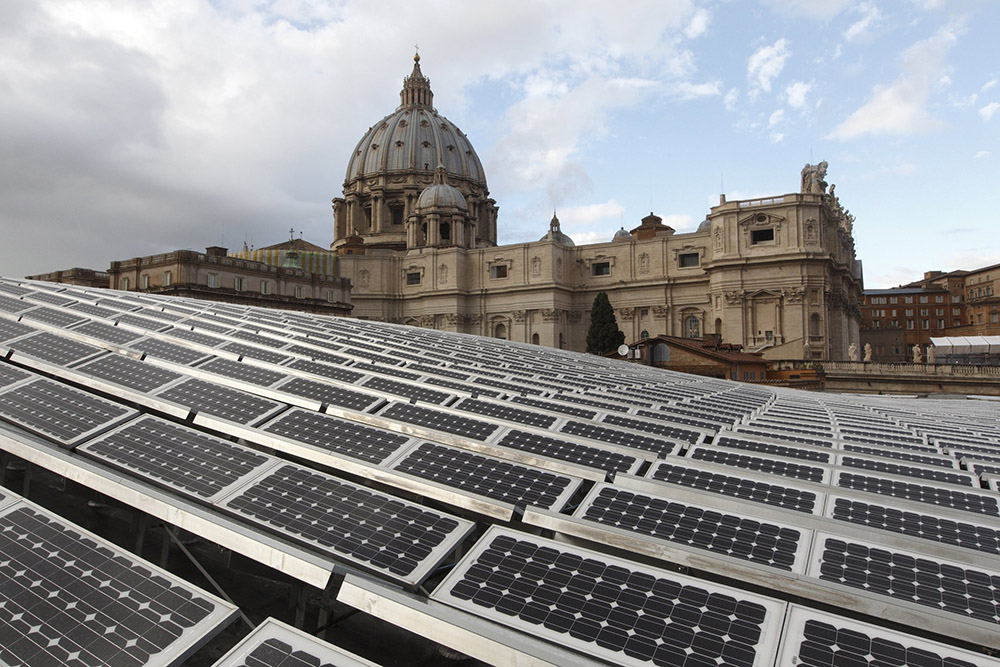
Solar panels are seen on the roof of the Paul VI audience hall at the Vatican in 2010. (CNS/Paul Haring)
This is preeminently true of each bishop who, faithful to the episcopal office of administering diocesan resources through prudent policies that embody Catholic social teaching, has the power to cut greenhouse gas emissions from diocesan-owned buildings in half from 2019 levels and reach net-zero carbon by 2040 at the latest.
This latter 2040 goal is informed by the courageous witness of students at Creighton University in Omaha, Nebraska. In a 2021 letter to university administrators, they referenced "The Climate Pledge" by which hundreds of companies have committed to reach net-zero carbon by 2040. They concluded, "If profit-motivated corporations are prudently committed to net zero by 2040, our mission-motivated Jesuit, Catholic university should also commit to this goal" (emphasis in original).
Examples, failures and opportunities
The Holy Father is leading by example and has committed the Vatican to become net-zero carbon. The Vatican's Laudato Si' Action Platform invites dioceses to similarly decarbonize.
The Catholic Bishops' Conference of England and Wales passed a resolution asking "dioceses of the Catholic Church in England and Wales to declare target dates for a stated reduction of carbon emissions or report on how close they are to having the information necessary to set such a target."
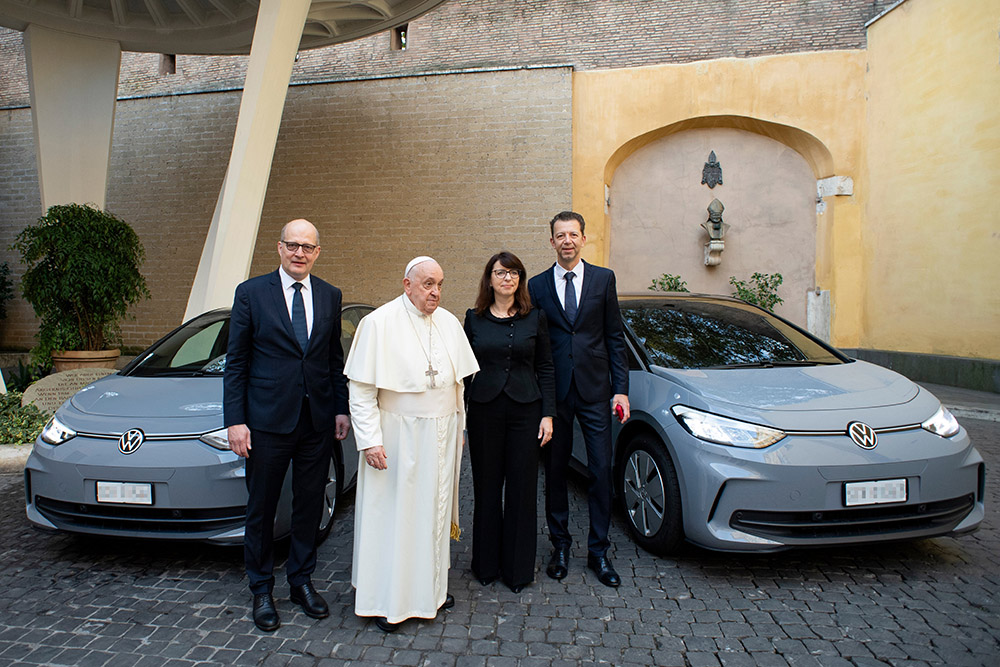
Pope Francis stands with representatives of Volkswagen at the Vatican Nov. 15, 2023. The Volkswagen officials delivered the first two of dozens of electric vehicles the company will supply to Vatican City State, starting in early 2024, to support the Vatican's plans to have a net-zero-emissions fleet of vehicles by 2030. (CNS/Courtesy of Volkswagen AG)
The Diocese of Salford, England, supports the collaborative Guardians of Creation Project with diocesan decarbonization resources.
Zinkula, who now leads the Dubuque Archdiocese, partnered with Catholic Climate Covenant when he was bishop of Davenport, Iowa, and committed the Davenport Diocese's chancery operations to net zero.
Cupich committed the Chicago Archdiocese to purchase renewable energy credits this year equivalent to the power consumed by the 2,000 buildings across the archdiocese's 400 parishes, schools, cemeteries and offices. Although renewable energy credits do not guarantee that a given entity will itself be directly powered by renewable energy and thus avoid greenhouse gas emissions, and while the annual commitment might not be renewed in the future, this step helps expand the renewable energy pool.
No other U.S. bishop has made any such diocesan commitment.
I have argued that the near-total lack of U.S. Catholic decarbonization commitments is a failure to faithfully live the church's evangelical mission. It is a social sin of omission — a failure to do the right thing — that compromises Catholic moral commitments, including to protect human life.
Decarbonization policies are a tremendous opportunity for bishops and the church.
A bishop's willingness to commit the diocese to decarbonization could inspire leaders of Catholic facilities not owned by the diocese — universities, hospitals and sometimes parishes — to follow suit. Since the U.S. church owns nearly 100,000 buildings, Catholic decarbonization could shift local energy markets and show society the morality of decarbonization.
This ecclesial social justice might catalyze civic social justice and is one reason Christiana Figueres, the former United Nations climate official who engineered the Paris Agreement, declared, "I believe that the U.S. Catholic Church should commit to zero emissions by 2040 as an institution."
A bishop's faithful commitment to a science-based decarbonization policy could also advance the new evangelization, especially among youth and young adults.
This population experiences tremendous anxiety about the climate crisis and prioritizes climate change as the most important issue. Concurrently, youth and young adults are disaffiliating from the church and expressing frustration with Catholic climate inaction.
As two young Catholics who addressed the Holy Father encapsulate, "Young people value authenticity and deplore hypocrisy. We told Pope Francis that U.S. Catholic leaders' failure to share and enact the church's own climate teachings is causing many in our generation to become disillusioned with the church."
Summarizing Benedict XVI, the U.S. bishops describe the new evangelization as "new in its methods that must correspond to the times." Almost to a T, a diocesan decarbonization policy would evangelize through a new method of "living testimony" that corresponds to what Gaudium et Spes calls "the griefs and the anxieties of the [youth] of this age."
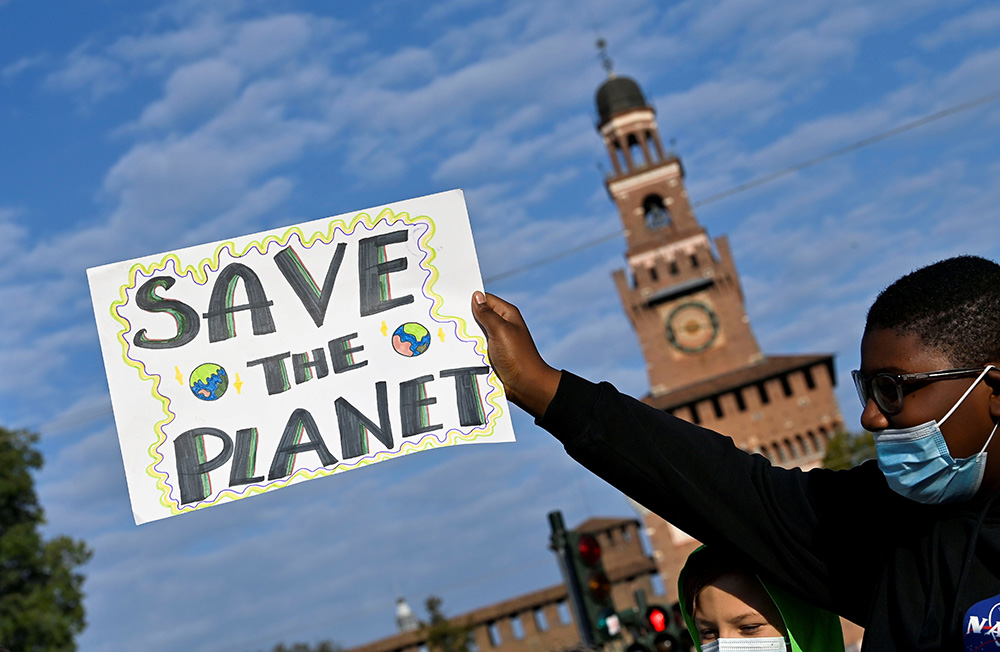
A demonstrator holds up a sign as he attends a Fridays for Future climate strike in Milan Oct. 1, 2021, ahead of the U.N. Climate Change Conference in Glasgow, Scotland. (CNS/Reuters/Flavio Lo Scalzo)
It would also simultaneously provide opportunities for evangelization through "spoken word" that shares the catechetical foundations of this action — especially if the diocese followed the Catholic Theological Society of America and simultaneously divested from fossil fuels using the U.S. bishops' Socially Responsible Investment Guidelines.
Methods and economics
A diocese must first identify which buildings to include in its decarbonization policy. Next, it has to conduct data-driven analyses. Although there are various processes, the Verdis Group Net Zero Pathway outlines the general method. Verdis Group is the firm supporting the Davenport Diocese's net-zero commitment, and its three-step Pathway corresponds to the look-judge-act method of Catholic social action as described in Mater et Magistra.
First, measure (look) greenhouse gas emissions from 2019. Next, target (judge) the various options to cut emissions in half from 2019 levels by 2030 and reach net zero by 2040 at the latest. Finally, implement (act) identified strategies.
All of this will cost money. However, a diocesan decarbonization policy is foremost an investment in evangelical mission. Relatedly, the church emphasizes that economic decisions must be guided by the interconnected values of Catholic social teaching rather than financials alone.
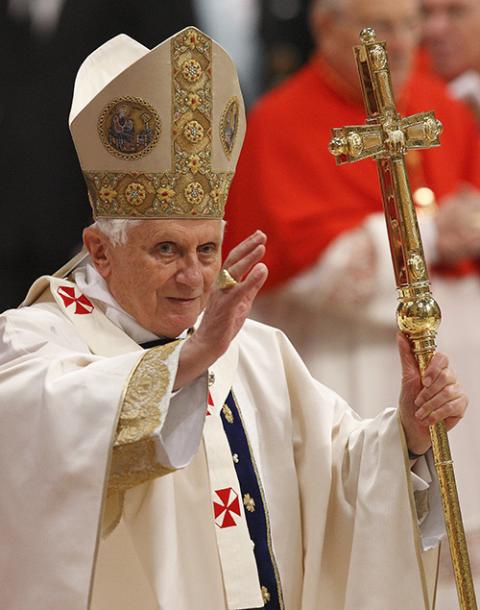
Pope Benedict XVI arrives to celebrate Mass on the feast of Mary Mother of God in St. Peter's Basilica at the Vatican Jan. 1, 2010. He also observed World Peace Day, saying that true respect for the environment requires seeing all of creation as a reflection of God, the creator. (CNS/Paul Haring)
Benedict XVI in Caritas in Veritate summarized church teaching that "every economic decision has a moral consequence" (emphasis in original).
John Paul II in Centesimus Annus stressed that the environment "cannot be safeguarded simply by market forces" of self-interested profit.
Benedict XVI in "If You Want to Cultivate Peace, Protect Creation" lamented "the lack of far-sighted official policies or to the pursuit of myopic economic interests, which then, tragically, become a serious threat to creation." In response, he urged that "when making use of natural resources, we should be concerned for their protection and consider the cost entailed — environmentally and socially — as an essential part of the overall expenses incurred."
The Vatican's Laudato Si' Action Platform names this approach ecological economics and calls dioceses to this goal.
Animated by ecological economics, a bishop has many options to fund a diocesan decarbonization policy. Some projects, such as energy efficiencies, can yield financial savings that can help fund larger activities. The Inflation Reduction Act, grants and programs like Catholic Energies may help offset costs.
Most dioceses have finance and development officers who can explore such options. They can also fundraise through annual appeals, second collections, planned giving and directed asks of major donors, which may include matched giving.
However, the bishop must first choose to use his authority and make decarbonization a pastoral priority.
Building a synodal culture of encounter
The synod on synodality encourages Catholics to dialogue with their bishop about how the church can live its evangelical mission more faithfully. Cupich and Cardinal Jean-Claude Hollerich have specifically encouraged Catholics to meet with church leaders about climate change.
Inspired by this synodal spirit and these episcopal invitations to build what Francis has repeatedly called a culture of encounter, Catholics in a diocese should organize themselves into a group, meet with their bishop, and utilize evidence-based strategies to advocate that he enact a science-based diocesan decarbonization policy. In particular, the group should employ the values-based narrative advocacy that Ignatian Solidarity Network outlines for social justice work with elected officials and that Catholic Climate Covenant has adapted for ecclesial social justice work with bishops.
These encounters would communicate diocesan support for this policy and encourage the bishop to respond to the sense of the faithful (sensus fidelium). In doing so, they would advance the Vatican's priority that moving toward the second session of the synodal assembly in October 2024, Catholics at the local level of the church increase "co-responsibility in the mission of all the members of the People of God."
Bishops are the preeminent stewards of the church's evangelical mission, which requires ecclesial social justice that embodies Catholic social teaching. Faced with the climate crisis, Catholics should encounter and inspire their bishop to recognize that faithfully and credibly living this mission invites exercising the episcopal administrative office to prioritize, enact and fund a science-based diocesan decarbonization policy.
This is an extraordinary opportunity for the church to evangelize people of faith and goodwill through "living testimony" that prophetically engages faith and reason.

